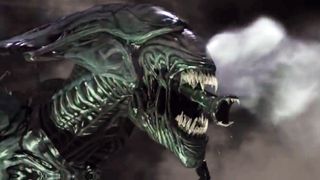8 questions I have after watching Alien: Covenant
Spoilers ahead, as we address the movie's biggest logic gaps, plot ambiguities and where the series goes next
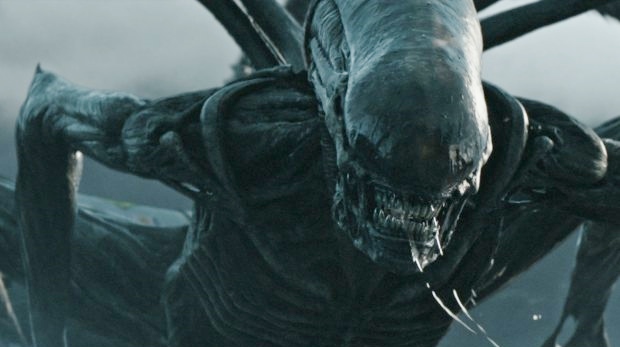
Alien: Covenant is out on Digital Download now, and while the movie does have some excellent moments, it’s also kind of a mess. Containing multiple revelations about what happened after Prometheus, as well as a couple of big lore drops for the overall series, it also raises multiple questions, not all (or even many) of which get answered by the end of the movie.
Some relate to the bigger picture, others pertain simply to what’s going on in Covenant itself. So join me, as I address all of them, and attempt to answer as much as I can. Feel free to throw in any of your own theories in the comments too. Just don’t forget to show your working.
**Obviously this article contains major spoilers for Alien: Covenant, so leave now if you want to avoid them, and come back after you’ve seen it**
1. How did the Covenant’s colonisation mission miss the Engineer homeworld?
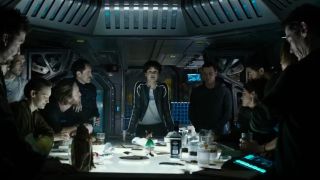
Somehow, the mission didn’t find it when looking for planets that could sustain human life. And the Engineer planet has been around for aaaages. The Engineers have been a highly advanced, space-faring species for literally longer than humanity has existed. David and Elizabeth landed on their planet ten years before the start of Alien: Covenant, and have presumably been sending their distress signal ever since.
So, given that the planet is suitable for humanity, and has had a signal pinging out from it for a decade, how was it missed when Weyland Industries / Weyland-Yutani was looking for colonisation sites? Did David change the atmosphere to make it suitable for human habitation after he arrived, for Elizabeth's benefit? Possible, but unlikely, as we know from Prometheus that Engineers can breath the same atmosphere we do. Another option is that the Covenant has been in space for more than 10 years already, launching before the Prometheus went on its own mission, though that would only explain the missed signal, not the missed planet overall.
Or maybe Weyland knew all about the planet, and its inhabitants, and had actively decided to leave well alone until it could come up with a decent plan for dealing with it (understandable given that it would be assumed teeming with Engineers). Then again, a simpler explanation might be that the Engineers just had their planet masked from outside scanning. Given that Elizabeth had to use their own ship’s mapping technology to find it in Prometheus - and that the Engineers would hardly want their creations casually stumbling upon their cosmic machinations - that'd make a lot of sense.
2. How did Elizabeth repair David?
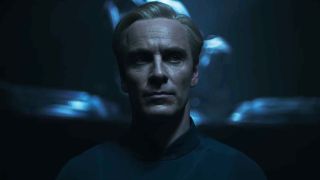
At the end of Prometheus, Elizabeth boards the Engineers’ ship with David's head in a bag. We also get the briefest of shots of her kicking his body out of the other Engineer ship, implying she's taking that along too. And in the Covenant prologue promo (a version of which appears in the film), she's seen gluing his head back onto what appears to be his original body with some kind of Sonic Screwdriver-style welding device. Unlike David’s wayward body parts, that doesn't entirely hold together.
Sign up for the Total Film Newsletter
Bringing all the latest movie news, features, and reviews to your inbox
The prologue tells us that Shaw (an archaeologist, not an android technician) is doing an inexpert job (with minimal tools), yet in Covenant, David seems in perfect condition. However, in Alien 3, despite being a more advanced synthetic in an era close to a century (maybe more) after Prometheus, Bishop claims he could never be satisfactorily repaired, after suffering pretty much the same fate as David. He states that the damage is so bad that he'd rather die.
So how could Shaw do it? She could have part-fixed him, then allowed David to do the rest, but given the limited resources available, and the less advanced science of the time, that still doesn't explain the Bishop factor. We're probably going to have to put this one down to the magic-wand plotting of 'Engineer technology helped fix him like human tech couldn't'. There's no evidence that it did, but there's little other explanation.
3. Why did David kill the Engineers?
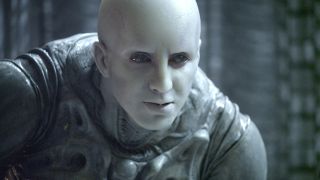
After the long, long journey to the Engineer homeworld, David marks his and Elizabeth’s momentous arrival by almost instantly killing everyone. He didn’t express any murderous desire toward the Engineers before starting the voyage, so what happened? You don’t just commit genocide on a whim. Well presumably there are three reasons. Firstly, he wanted a blank slate upon which to carry out his research uninterrupted, his quiet hatred for humankind only growing after Prometheus. He had a plan for humanity's downfall, and he needed the Engineer planet (and its technology) all to himself in order to carry it out. Even though the Engineers seemed to have the same ‘no more humans’ goal in Prometheus, after killing Weyland and tearing David's head off, it's highly unlikely that they'd have been open to an offer of collaboration. Secondly, he probably wanted revenge for having his head torn off.
Third, we know that David's schtick is now the assertion of autonomy over his creator. He hates nothing more the idea of being in thrall to anyone. The Engineers - as the creators of his creator - represented the ultimate version of his least favourite thing, and so they had to go.
4. Why did David kill Elizabeth?
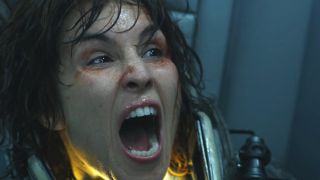
We're told by David (who's lying) that Elizabeth died in the ship's crash (which didn't actually happen). We know that she must have survived long enough, in a healthy state, to send that distress signal, but she's absent from most of the rest of the film, now dead for an indeterminate period of time.
We do though, later see images of her body, dismembered, vivisected, and otherwise messed up. Toward the end of the film, David tells Daniels that he's 'going to do to you what I did to her', but what is that exactly? The frontrunner idea right now is that he kept Elizabeth alive for a period in order to extract human DNA and matter for use in his experiments in genetic engineering.
In order to create the Xenomorphs and Neomorphs, he probably needed some kind of humanoid genetic material, given that the raw Engineer 'virus' at least partly bonds with the make-up of its host. That's stated in the film, but we can also see it clearly in the original Alien films, where the Xeno takes on a smaller, more animalistic form when spawned from a dog (or bull, depending on the version of the film) in Alien 3. Just ignore Shaw's squid-baby in Prometheus. Not much in Prometheus makes sense.
5. How did David have time to impersonate Walter?
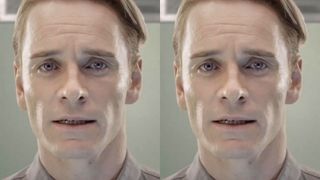
Between fighting with his brother and arriving at the shuttle back to the Covenant, David must have found time to melt off a hand and repair his internal voice-box. He needed to do both of those things in order to masquerade as Walter in Covenant's final act. The last time we see him before the deception, he's equipped with a full complement of extremities, and Walter has punched him so hard that his voice modulator has taken on that warbly, staticy vibe we know from Ash and Bishop's carbonara-spewing final moments. Yet, seemingly minutes later, he's wearing Walter's clothes, has a missing hand, and sounds absolutely fine.
The first two are explainable. A quick clothing change is no problem, and for the hand, David could likely have harvested some acid-blood from one of the many alien specimens he has lying around the place; hell, punching through a Facehugger egg would have done it. But the voice fix and timescale are tricky. The former could be explained by the Engineer facility having really good universal repair technology, but the timescale is more problematic. Though to be fair, sense of time and place aren't exactly Covenant's strong points. Things just sort of happen where and when the plot needs them to.
6. How do the Xenomorph eggs end up on the ship in Alien?
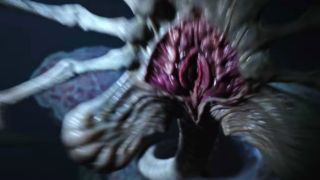
So it seems that the Aliens were created not by the Engineers, but by David. And regardless of how you feel about that, in regard to wider Alien lore and the unfathomable, cosmic mystique that has always made the creatures so profoundly affecting, it does raise some big questions. Like, if the Xenomorphs are David's creation, and effectively his bespoke pet monsters to do with what he wishes (mainly killing humanity) - and David has already killed the Engineers - then how do the Alien eggs end up on a Engineer ship seemingly piloted by an Engineer, at the start of Alien, around 20 years later?
The path from here to there seems... messy, to say the least.
As I see it, there are two options. Either the Engineers aren't all dead - maybe some survived, or there are more off-world - and at some point over the next two prequel films they'll swoop back in to stop David’s plan (despite sharing a common goal), steal his reserve of Alien eggs, and hole up on 426 transmitting a warning beacon to protect the worlds they apparently want to destroy. Feasible, but not currently entirely logical based on what we know about present character motivations. Or, that's actually not a chest-burst Engineer in the Space Jockey seat at the start of Alien.
Maybe it's Daniels. Maybe it's a still-functioning Walter, having repaired himself with whatever technology Elizabeth used to fix David (though that would require the further revelation that androids can be impregnated by Facehuggers). Of course, this latter theory also has the major problem that Engineers are at least a third bigger than humans or synthetics.
Basically, there's no way this plotline ties neatly into existing Alien lore at the moment. Those Facehugger embryos David has at the end explains how the Xenos get off-world, but it doesn’t remotely cover how the Engineers take possession of the Aliens. Though there might be a workaround, by way of another question Covenant throws up. Namely:
7. Has David *really* created the Aliens?
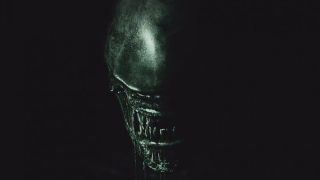
As in, is the creature that comes from the eggs the final, complete Xenomorph we know from the original series? Nothing in Covenant says that it isn't, but there are a couple of points to ponder. The Facehugger eggs, for instance, seem a fair bit bigger than we're used to, and the full-grown Alien itself feels sleeker and more slender. Maybe these are a nearly-there, proto build, that David will refine slightly over the next couple of films. Then again, Alien biology is more than capable of evolving slightly from spawn to spawn, so the differences might not be a big deal.
Though there's also the question of how Alien Queens factor into David's design. Where do they come from, if they weren't in his original blueprint for the species? All we see in Covenant are Facehuggers, Xenomorphs, and Neomorphs. There’s not even a sketch of a possible Queen design in David's very well annotated lab-cum-workshop.
And on a related point…
8. How has David 'tamed' the aliens?

We know that Xenos will happily - and quickly - kill synthetic and human alike (sorry, Bishop), but it might be feasible that David could form some understanding with the Neomorphs over the long-term. Having created them, he'll understand their nature better than a stranger will, and might even have designed them to be less feral than the Xenos we know. But forming that sort of relationship would still take time. The newborn Neomorphs we see in Covenant's first act instinctively tear through any life-form they encounter (sorry, landing party), and David's face-to-face encounter with a full-grown one later is, for all its dearth of violence, still a tense experience. He's not absolutely sure he's on top of the situation.
And then there's the chestburster that results from Orens' unfortunate encounter with David's favourite project. It doesn't behave like any chestburster we've ever seen. They always scurry away on instinct, finding a safe, dark place in which to grow before going on the attack. Not only does David manage to make this one mimic him as if his offspring, he manages to do so after the creature, post-emergence, seemingly decides to calmly hang out for a while. Highly unusual, especially for a seconds-old Xeno that David has no prior relationship with.
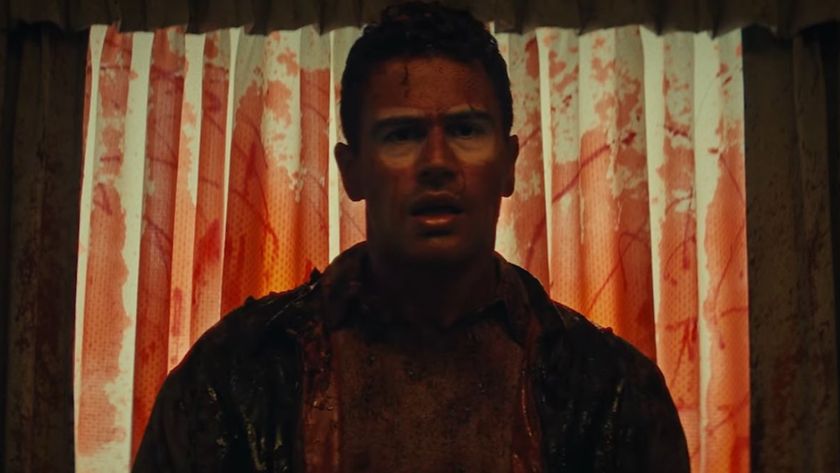
The Monkey's Tatiana Maslany reacts to the horror movie's most shocking death: "It's so wrong, and I think that's why it's so right"
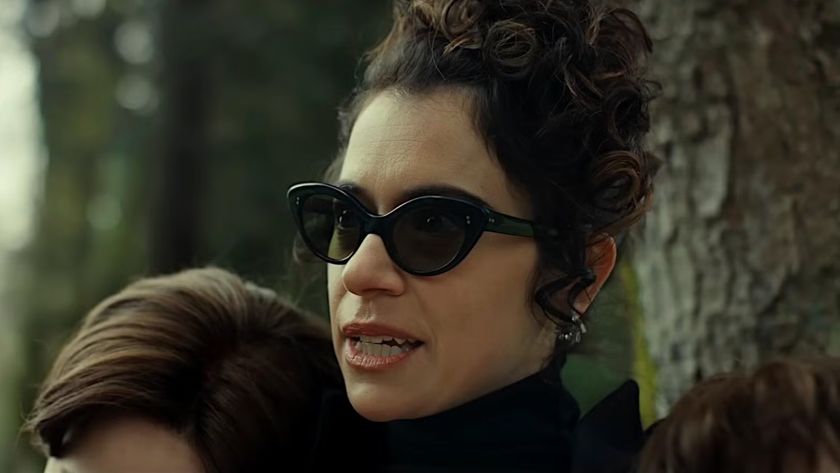
She-Hulk star Tatiana Maslany says her next horror movie with Osgood Perkins won't be anything like The Monkey or Longlegs: "There's always a little mischief"
Most Popular






